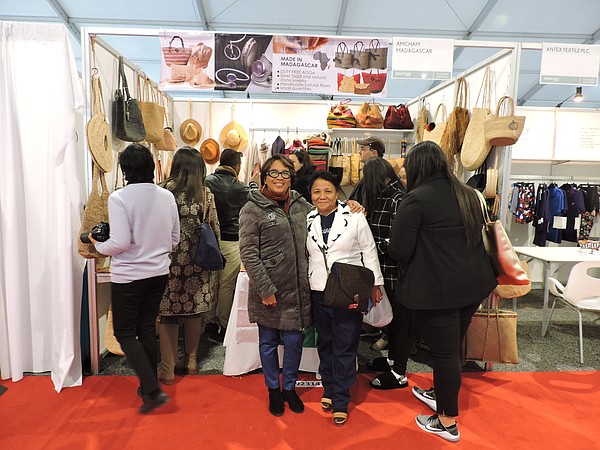TRADE SHOWS
Sourcing at MAGIC Exhibitors From Around the World Report Traffic After China Ban
Hosted in a tent across from the Mandalay Convention Center, Sourcing at MAGIC opened one day earlier than its sibling Informa-produced trade shows. The show opened its doors Feb. 4 despite the travel ban that barred exhibitors from China from entering the United States when it was implemented Jan. 31.
Unbothered by the absence of China-based representatives, Pua Medina, owner of the Hawaii-based brand Kapuau‘i, found potential partners in Vrijesh Natural Fibre & Fabrics and Kish from India to source fabrics for her scarves and kimono tops.
“They had a lot of colors such as the natural, neutrals things you would find in nature. Their dyes were just beautiful,” she said. “There was a display of this one dress in colors I love working with.”
Representing Madagasar’s female artisans, a group of first-time attendees exhibited ecologically sound goods that promoted fair wages and elevating the status of women in the region who are economically challenged. With the help of the American Chamber of Commerce in Madagascar, Vola Lee and Vololona Rasoarimanana of Unik Bags; Zara Rajaonarisoa and Ranaivo Onintsoa Diamondra of Diamondra Creation; and Rakotohavana Nivo-Harinoro of Nivo Jewels and Precious Stones sought to expand their reach into the United States.
"Not only are we businesswomen, but the reason for me to come here is that our materials—such as raffia—are ecological. Many women work on it in Madagascar weaving it with their hands," Lee said. "I met a woman making raffia bags on the street and she sold her bags that were handmade. I told her I would like to help her. I came here for that reason."
Founder of YANA—or You Are Not Alone Gifts—Wayne A. Grover didn’t seem to mind the absence of vendors from China. While he was searching for supply-chain partners to produce soft, quality T-shirts for his brand whose mission is to combat loneliness, he wanted shift his U.S. manufacturing to production in Mexico or with a South American partner.
“People love our T-shirts because they are so soft and stylish, but it’s so expensive,” he said. “We need to find high quality, super soft and it’s hard to get the right pricepoint.”
At the booth for The Common Link, founder Wilson Avalos, who is based in Los Angeles offered options for brands of all sizes, whether they sought domestic manufacturing or production abroad.
“People are still interested in made in the U.S.A., but they can’t afford it. A lot of people are stopping by but they are smaller and don’t have the infrastructure yet,” he said. “Making apparel in the U.S., basically in Los Angeles, it is important that it is small. These people try to go to Mexico or Asia, but the first thing they hear is ‘No, I can’t make 300 units.’ As a company, we make everything.”
Celebrating its 15th anniversary, Adam Sheridan, owner of Seattle, Wash.’s The Purple Store mentioned that he saw a bit more of a presence from United States vendors. In a store that sells only purple items, he was particular about the options vendors offered.
“The lesson we’re learning when sourcing is that we’re looking for the right people,” he said. “They’ll all have a different material or differing offering, but we need to find people who have the same sensibilities as we do and will be easy and fun to work with.”






















